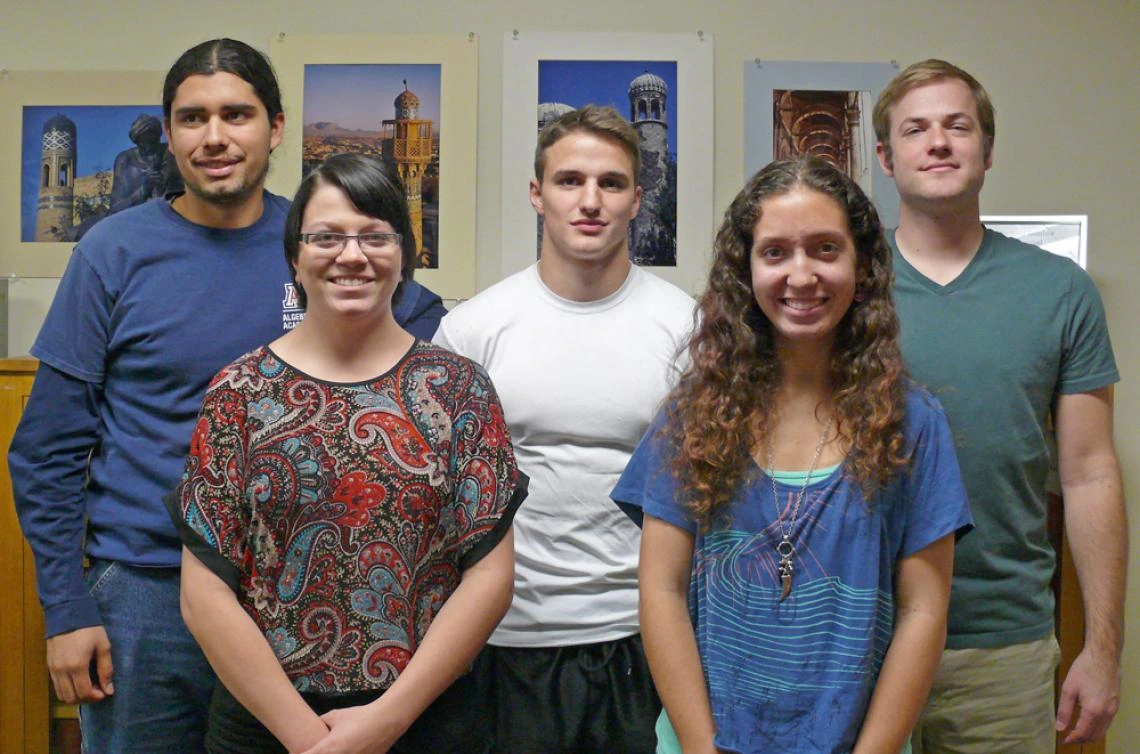UA Expands Arabic Instruction After Being Named Flagship Program
The UA has launched the Arabic Flagship Program as part of a national initiative that aims to train more people to speak Arabic, considered a "critical" language for national security.

Arizona Arabic Flagship Program students Michael Guyer, Jaime Zettlemoyer, Joshua Larson, Megan Kleinwachter and William Schlanger were among those who recently took part in a full day of standardized Arabic exams, which will decide whether they qualify for scholarships to pursue intensive summer or year-long study abroad. (left to right)
With newly awarded federal funding, the University of Arizona has launched a program to prepare undergraduates to reach superior-level fluency in Arabic, which will allow them to engage confidently with academic, business and political partners in the Arabic-speaking world when they graduate.
The UA was one of five universities selected to participate in the Arabic language flagship program. The others are Michigan State University, the University of Maryland, College Park, the University of Oklahoma and the University of Texas at Austin.
The Arabic Flagship Program is funded by the U.S. Department of Defense, which supports the learning of "critical languages" such as Arabic, because these languages are considered critical for U.S national security and economic competitiveness, and because not many people have been trained to speak them.
During the spring 2013 semester, the curriculum for the Arizona Arabic Flagship Program was developed and instructors were hired. The first cohort of students began in the fall.
"We have seen a rapid spike in progress among students who have joined the program in the summer and at the start of the fall semester," said Sonia Shiri, the academic director of the program at the UA and also an assistant professor of the School of Middle Eastern & North African Studies. "Now they are much more confident speakers."
The Arabic Flagship Program is administered by the Washington, D.C.-based National Security Educational Program and the Institute for International Education. An overseas study component of the program is administered by the American Councils for International Education.
At the UA, the program is housed in the School of Middle Eastern & North African Studies, which is part of the College of Social and Behavioral Sciences. The school, which received $660,000 for the first two-year cycle, will receive an additional $900,000 for the following three-year cycle, which is contingent upon Congress reauthorizing the funding.
The program is open to all UA students – regardless of the area they're studying.
"You are learning Arabic by practicing Arabic," said anthropology major Meagan Kleinwachter, who hopes to use her Arabic skills to help her to be a better doctor one day.
In the past the UA taught standard Arabic and offered only one dialect. Now, in addition to standard Arabic, the UA teaches three dialects: Levantine, Egyptian and, starting this semester, Moroccan. MENAS also offers two "conversation circles" each week for each dialect and for standard Arabic. Students converse and sometimes play games, dance, sing songs, watch movie clips and eat Middle Eastern food.
Flagship students receive one-on-one tutoring twice a week. Shiri monitors the tutors, who give her weekly reports on how the students are doing. Her goal is to constantly tweak the learning strategies so that students are not merely repeating what they do in class.
In addition to funding new instructor positions, the grant to the UA is being used to provide teaching assistants for all Arabic classes.
Shiri thinks the strategies used in the Flagship program can also be adopted by other language programs as has been demonstrated on other campuses.
"As we continue to grow, we would like to see the Flagship experience and the love of language learning shared by Flagship and non-Flagship students alike," Shiri said.
Students who complete the Flagship program receive certification indicating their level of expertise. No government service is required of students and no conditions are placed on the institution regarding the curriculum or its implementation.
Shiri is continuing to accept students into the program on a rolling basis. While freshmen and sophomores are preferred, students can join the program at any time during their academic career.
Also, ROTC students are encouraged to apply to the program. Cadets in the program who are receiving any ROTC scholarship are eligible to receive full funding for the program's summer programs abroad.
Also in the program, students are paired with native speakers from campus, who they meet with every week in a more unstructured environment.
"In the beginning of the semester, my language partner and I went to a restaurant and he taught me how to order in Arabic," said Honors College student Jaime Zettlemoyer, who is majoring in anthropology and Middle Eastern and North African studies.
"Then we went to a church service that was entirely in Arabic," Zettlemoyer said. "It was fascinating, and I met a lot of people."

